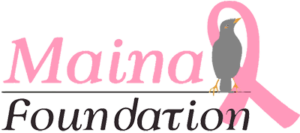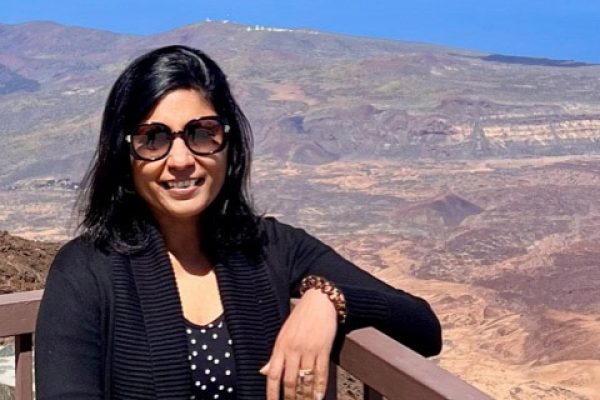
NEWSLETTER
September 2023

Welcome to the Maina Foundation Newsletter!
An Inspiring Interview With Maina Foundation
Board Member and Medical Oncologist
Dr. Renuka Dulala, MD
By Manju Soni
Hi Friends,
I feel grateful to be here to write this month’s newsletter. About two weeks ago, during an intense afternoon thunderstorm, the powers above decided to target our garden with a lightning strike. Imagine hearing the boom of thunder just above our house, and an instantaneous snap-snap as the lighting hit the ground and a huge surge of energy zapped its way through the ground and fried our modem and router. Thankfully, although a number of circuit boards around our house were fried, I was not, and I’m still around to annoy my kids with superlong text messages with confusing emojis. :))))))))
I felt a small smidgen of what grateful cancer patients and their families feel when they receive good news. With that in mind we at Maina Foundation are hoping you will join us for October’s Breast Cancer Prevention month by starting a Facebook fundraiser to support the work we do in saving lives with early detection. The details are at the end of the newsletter.
For this month’s newsletter I interviewed Dr. Renuka Dulala, MD a dedicated medical oncologist who takes care of cancer patients, including breast cancer patients, and who is also a board member of Maina Foundation.
Tell me a little bit about yourself please.
I grew up in Hyderabad, both my parents are physicians. After high school, I went to Osmania Medical College in Hyderabad where I met my husband. In the early 1990s, he came to the US to do his postgrad studies, and I came here to do my residency in internal medicine. I had two boys, and, in that time, I worked as an internist for several years. While working as an internist, I began to take care of cancer patients, and I decided to do a fellowship in hematology/oncology.
I work at Holyoke Medical Center as one of two medical oncologists in the hematology/oncology services. We serve a large population, many are indigent with limited resources.
Currently, I see a variety of cancer patients, many with breast cancer, and we also treat patients with benign hematological conditions.
Tell us a little bit about breast cancer specifically.
It’s the most common cancer diagnosed in the world today. It accounts for about 11.7% of all new cancer diagnoses.
There’s an increase in new cases partly due to the population living longer and also the availability of better screening procedures.
In spite of this, in the western world, death rates from breast cancer have decreased partly because of earlier diagnosis and also better treatments. Unfortunately, in developing countries, mortality is actually increasing. We’re also seeing younger patients developing breast cancer, and generally the younger the patient, the more aggressive the cancer.
What is the reason for this increase in developing countries?
It’s difficult to pin down an exact reason but there are a number of factors that may play a role. One is lifestyle changes, people are more desk bound, less active, with that there is often a concurrent increase in body weight. There are environmental factors, many of which are unknown, but an increase in cigarette smoking and alcohol may play a role, and then there’s a lack of education and access to mammograms. Patient affordability of preventative measures and treatment is a big issue in terms of mortality. There’s also a social stigma associated with examination by a male doctor in some countries.
I suppose this is where the Maina Foundation is helpful.
Definitely, the outreach programs of Maina Foundation and other organizations help by focusing on screening and also education and raising awareness. They reach out to underserved populations that don’t have easy access to medical care.
What are some of the risk factors for breast cancer.
These can be divided into modifiable and non-modifiable risk factors.
The modifiable ones are generally lifestyle factors, such as obesity, inactivity, the increasing reliance on processed foods in our diets, and smoking and alcohol use.
The non-modifiable factors include genetics, patients with dense breasts, patients who haven’t had any children, patients who have early menarche and late menopause. Many of these factors increase the patient’s lifetime exposure to estrogen, which is a risk factor.
Younger patients tend to have more aggressive disease, such as triple negative disease or HER2 positive cancers. These are often called interval cancers because they occur in the time between annual screening mammograms.
On the positive side, survival is often high even in young patients. In spite of the cancer being quite aggressive, there are good therapies now even for triple negative and HER2 positive breast cancer.
The US Preventative Task Force is revising its guidelines, which currently state, “The decision to start screening mammography in women prior to age 50 years should be an individual one. Women who place a higher value on the potential benefit than the potential harms may choose to begin biennial screening between the ages of 40 and 49 years.”
How do you approach a patient who is referred to you with breast cancer?
We work very closely in teams comprised of surgical and medical oncologists, radiation oncologists, intervention radiologists, nurses, social workers, nurse navigators, and also pathologists who are critical in helping us differentiate the type of cancer and its grading and also its markers, so we can tailor therapy for the patient.
When a patient is referred to our hospital with most likely a lump, they have a diagnostic mammogram, and then are referred for a biopsy which is performed by the radiologist. The biopsy is sent to the pathologist for characterization of its type and stage. We do hormonal and molecular markers routinely for all patients so we can decide whether hormonal or targeted therapies would be useful to treat that particular patient’s cancer. We also do extensive genetic assessments, such as BRCA, which helps with the decision to use certain types of drugs.
These markers are often predictive in that they tell us whether the patient will be responsive to certain therapies, and they are also prognostic in that they tell us how aggressive the tumor is.
Each patient and their cancer are unique, and therapy is often tailored for individual patients.
The patient is referred to the surgical and medical oncologist, that is us, for assessment. The team then decides whether the patient should have neo-adjuvant therapy, that is prior to surgery to shrink the tumor, or adjuvant therapy, that is after surgery.
All of this is coordinated by nurse navigators with the assistance of social workers as well.
We have a tumor board that meets twice a month where we discuss individual cases.
We, the medical oncologists, follow the patient up for the next 5 – 10 years.
This sounds fascinating and I’m curious to know what drew you into this field.
I was initially very scared of this field. Many years ago, the patients with cancer that I encountered looked so sick, and it seemed to be a very depressing specialty. But then I begin to take care of patients who had been through cancer treatments and it was very rewarding. With new treatments patients were living longer and surviving their cancer therapies. The field was booming and I was ready for a new challenge.
It requires a lot of commitment to undertake such training, how did you manage to be both a mom and a wife, as well as to do all the training and hard work that goes into your field?
It is difficult, and the maternal guilt is huge. While training in hematology/ oncology I had to be away from home a lot. For three years I saw my children only on weekends and that was a big sacrifice for us all. It was tough, but I’m very lucky to have my husband and also extended family who helped. I often still jokingly ask my children whether they need therapy from their mother being absent so often.
What do your children do? Did they go into the medical field like you and your husband?
No, my older son is in finance, and my younger son is a naval officer.
How do you cope with losing patients?
It is very hard. I recently lost a 40-year-old patient who died of colon cancer. And the worst is when you have to tell the patient you can’t do anything more for them. But I’m always grateful because patients are incredible. They’ve been through so much and yet they are often very accepting and appreciative of everything we have tried to do for them. It’s a humbling experience.
And sometimes, like everyone else, I do cry. But I have to move on. I am in awe of my patients who have so much courage to face death. Some patients are very accepting of it and yet others struggle to face their mortality. And age is not a factor in this, I have 85-year-old patients who struggle to accept they have advanced stages of cancer, and then I have a 50-year-old who has pancreatic cancer and has made a choice that enough is enough.
And, of course it helps to be married to a physician and be able to talk about these issues and these emotions. We have a supportive staff team who are also going through this together with me, so we have a built-in support group.
What is your day like?
It’s a 10-hour day between 7 AM and 7 PM. But often I’m online trying to plan for my day around 6:30 AM. I see my first patient at 8 AM and our last patient is around 4:30 PM. But then I often have labs to review and phone calls to make and orders to write out. I do take one day of the week off which is my sanity saver. And we are only two medical oncologists on staff, so we have to manage our time well.
I’m always online even when I’m off because I don’t like to be surprised about my patients. And I never take more than a week off at a time. For the last 10 years I’ve never taken more than 10 days off for a vacation, even when I go overseas.
Do you have any advice for our readers?
Yes, I would say you should cherish every day, this is what treating cancer patients has taught me.
Don’t take your health for granted, and respect your body. Eating healthy, exercising regularly, cutting down on processed foods, limiting alcohol and definitely stopping smoking, are all important lifestyle changes we can control.
And have your screening mammogram regularly.
Thank you so much Renuka for your time and your dedication to cancer patients.
Manju Soni (she/her) (pen name: M. J. Soni) is a former eye surgeon turned author. She is the author of Defying Apartheid, her debut nonfiction book that captures her experiences of being a young activist against apartheid. Her short fiction and essays has appeared in Ellery Queen Mystery Magazine, Akashic Books, Apeiron Review and The Establishment. She’s a member of Crime Writers of Color and Sisters in Crime (National and Connecticut).
https://manjusoni.com | https://twitter.com/MJSoniWrites
News!

Facebook Fundraiser
October is Breast Cancer Awareness Month. One thing that’s really helped us in the past is for our supporters to run a Facebook Fundraiser to run October 1 – 30.
Here are the simple steps to follow to get the fundraiser off the ground. Once up and running you’ll need to rally your friends to donate to this
worthy cause.
Instructions on starting a Facebook Fundraiser for Maina Foundation:
1. Log on to your page or go to https://www.facebook.com/fundraisers
2. On the Fundraisers page, Click on Raise money
3. Choose our non-profit – Maina Foundation
Q. How much money do you want to raise and when will your fundraiser end?
A. You can put down an amount as a goal and add the time you want it to end. (Breast Cancer Month ends in Oct).
Q. What is the title of your fundraiser?
A. October is Breast Cancer Awareness Month.
Q. Why are you raising money?
A. (You can include your own personal story – if you like or use the text provided below)
October is breast cancer awareness month. Your contribution will make an impact, whether you donate $5 or $500. Every little bit helps.
Maina Foundation is a non -profit organization dedicated to providing critical funding for increasing breast cancer awareness and promoting early detection to women in need of financial assistance. Through strategic collaborations and a grassroots approach, our foundation aims
to empower women through health education and innovative medical care for breast cancer. Thank you for your support!
You have now created a fundraiser!
Share your Fundraiser on Facebook or copy your fundraiser link to share it through email, Instagram, Twitter or wherever else you connect with friends.
We thank you for your continued support!
For more information on Maina Foundation, and to help its mission, go to https://mainafoundation.org or contact us at 860-434-3985 or info@mainafoundation.org
SAVE A LIFE - DONATE NOW
Donations can also be mailed to:
8 Peppermint Ridge, Old Lyme, CT 06371, USA

